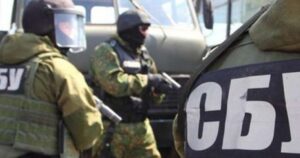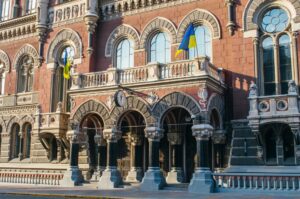
The premises of the National Union of Architects of Ukraine (NUAU) are being searched, said Anna Kiriy, Deputy Chairman of the Architectural Chamber of the NUAU.
“Just now there is a search in the premises of the NSAU. As many as two majors and one lieutenant of the SBU are involved. Apparently, such important people in time of war should coddle the professional National Union, and not look for Russian saboteurs,” she wrote on Facebook.
According to her, there is a seizure of equipment and computers.
Source: https://www.facebook.com/anna.kyrii
https://www.facebook.com/photo?fbid=6121115427921949&set=pcb.6121159117917580

The Verkhovna Rada intends to regulate the sphere of handling genetically modified organisms (GMOs) and improve the system of assessing their risks as to their possible impact on human health and the environment.
The relevant draft law No. 5839 “On state regulation of genetically engineered activities and state control over the handling of GMOs and genetically modified products to ensure food security” was approved as a basis at the parliamentary session on Wednesday by 247 MPs (with the required 226 votes), a member of the Golos faction Yaroslav Zheleznyak said in a Telegram feed.
According to the explanatory note to the document, its adoption will allow to delineate the powers of public authorities to eliminate duplication of functions in the field of handling GMOs, to improve the system of risk assessment of GMOs on the possible impact on human health and the environment.
In addition, the document will implement European mechanisms for state registration of GMOs in Ukraine, improve the requirements for labeling of GMO products and establish the rules of their traceability as well as strengthen the state control in the field of GMO handling and establish liability for violation of the legislation in this area.
Thus, the adoption of the draft law will allow achieving systemic compatibility of Ukrainian legislation with the EU legislation in the field of GMO handling, which is envisaged by Ukraine’s obligations under the Association Agreement.

Banks with foreign capital Alfa Bank and Raiffeisen Bank (both in Kiev) topped the list of 46 profitable banks in September with net profit UAH 558.2 million and UAH 522.3 million respectively.
According to the data published by the National Bank of Ukraine on its website with a significant delay, Alfa Bank reduced its reserves by UAH 646.1 mln, while Raiffeisen Bank showed a profit despite the formation of additional 667.9 mln reserves.
Alfa’s assets decreased by UAH 6.6 bln, or 5.9%, while Raiffeisen Bank increased by UAH 5.1 bln, or 3.2%.
There are also three banks with foreign capital in the top five leading positions in September: OTP Bank – UAH 423.0 mln, Ukrsibbank – UAH 399.1 mln and Citibank – UAH 390.5 mln.
Oshchadbank lagged a little behind, showing UAH 371.4 mln of profit in September, despite the increase in reserves by another UAH 1.18 bln. Universal Bank (mono) followed with UAH 222.9 mln and Credit Dnipro Bank with UAH 178.1 mln.
Alfa Bank managed to improve its financial results in September after the largest loss of UAH 1.357 billion, which was registered in August among all banks, while Ukreximbank, that ranked second from the bottom with losses of UAH 1.103 billion, demonstrated only poorer results in September: UAH 3.5 billion with an increase of reserves by UAH 2.47 billion and assets by UAH 16.93 billion.
PrivatBank went from the most profitable bank in August (UAH 3.21 billion) to one of the most unprofitable in September, having showed negative financial results of UAH 317.4 million and decrease of assets by UAH 20.02 billion with insignificant growth of reserves by UAH 0.07 billion.
Idea Bank (UAH 190.3 mln (UAH 67.6 mln), FUIB (UAH 183.1 mln) (UAH 498.1 mln), ProCredit Bank (UAH 145.3 mln) and Alliance Bank (UAH 138.1 mln (UAH 86 mln)) were among the banks with significant losses as of September.
According to the results of nine months of this year, PrivatBank remains the most profitable – UAH 13.83 billion.
It is followed by Oshchadbank with 2.71 billion UAH, Raiffeisen Bank with 2.39 billion UAH, Ukrsibbank with 2.10 billion UAH and Citibank with 1.51 billion UAH, and three private Ukrainian banks: Universal Bank with 0.88 billion UAH, Pivdenny Bank with 0.34 billion UAH and Aybox Bank with 0.29 billion UAH.
The biggest losses in January-September were shown by Ukreximbank – UAH 7.91 billion, Alfa Bank – UAH 4.32 billion, and state-owned Ukrgasbank – UAH 3.36 billion.
ProCredit Bank and Idea Bank are at the bottom of the five losing banks with UAH 1.43 billion and UAH 0.23 billion.
Within nine months of this year 44 banks showed net profit, while 23 banks showed net loss.
The total net profit of all banks amounted to 7.37 billion UAH after the net loss, including 1.06 billion UAH in September. However, excluding PrivatBank, the financial result of the banking system for the nine months will also be negative – 6.46 billion UAH.
According to the National Bank, in September, the total portfolio of government bonds of all banks decreased by UAH 0.24 billion, most of all in Alpha Bank – UAH 1.97 billion, while FUIB – UAH 0.56 billion, Citibank – UAH 0.5 billion, RVS Bank – UAH 0.46 billion.
At the same time, Raiffeisenbank and Oschadbank increased their portfolios of government bonds by UAH 1.09 bln and UAH 2.83 bln, respectively.

According to customs statistics released by the State Customs Service of Ukraine, the export of aluminum and aluminum products for 10 months of 2022 from Ukraine decreased by 39.1% compared to January-October 2021 – to $83.556 million (in October – $7.695 million), and lead and lead products by 69.5% – to $9.769 million ($0.4 million), nickel and nickel products – by 72.5%, to $1.086 million ($0.007 million).
At the same time, exports of aluminum and aluminum products for 2021 increased by 53.9% to $169.094 million, lead and lead products by 52.8% to $38.229 million and nickel and nickel products by 55% to $4.856 million.

Oil prices are falling moderately on Wednesday morning after a rise in the previous session, during which quotations renewed a three-week low.
The value of January futures for Brent on London’s ICE Futures Exchange stood at $93.28 a barrel by 7:08 a.m., down $0.58 (0.62%) from the close of the previous session. Those contracts rose $0.72 (0.8%) to $91.53 per barrel at the close of trading on Tuesday.
The price of WTI futures for December at electronic trades of the New York Mercantile Exchange (NYMEX) is $86.2 per barrel by that time which is $0.72 (0.83%) lower than the final value of the previous session. The day before contract rose by $1.05 (1.2%) to $86.92 per barrel.
The International Energy Agency (IEA) on Tuesday raised its forecast for oil demand growth by 180,000 bpd in 2022, but the forecast for 2023 was lowered by 40,000 bpd.
The agency also noted that by December 5, when the European embargo on Russian oil imports takes effect, Russia will need to divert another 1.1 million b/d to exports to other countries.
Oil also reacted to news about a rocket explosion in Poland, which killed two people. A number of media wrote that the missile could have come from Russian territory, but the Russian Defense Ministry denied that it was Russian missiles, noting that the military did not strike targets near the Ukrainian-Polish border.
Also, the market is waiting for the weekly U.S. fuel inventories data, which will be published at 5:30 p.m. Wednesday.
The American Petroleum Institute’s (API) report, released the previous evening, showed a 5.8 mln barrel drop in crude stocks last week. Gasoline stocks, according to API data, grew by 1.7 mln barrels, distillates – by 850,000 barrels.
Import of goods to Ukraine in % to the previous period in 2021 and 2022

SSC of Ukraine